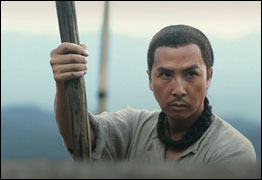
Donnie Yen stars in 'Wu Xia.'
A Weinstein Co. (international)/We Distribution (in Asia) release of a Stellar Mega Films, We Pictures, Dingsheng Cultural Industry Investment Co., JSBC Eudemonia Blue Ocean TV & Movie Group, Yunnan Film Group presentation of a We Pictures production. (International sales: We Distribution, Hong Kong.) Produced by Peter Ho-sun Chan, Jojo Hui Yuey-chun. Executive producers, Chan, Qin Hong, Zhou Li, Yang Zhiguo, Alan Zhang, Huang Jianxin. Co-producers, Lu York, Dong Keyan, Hong Tao, Jiang Wenbo. Directed by Peter Ho-sun Chan. Screenplay, Aubrey Lam. Co-writer, Joyce Chan.
With: Donnie Yen, Takeshi Kaneshiro, Tang Wei, Jimmy Wang Yu, Kara Wai Ying-hung, Li Xiaoran. (Mandarin dialogue)
The repressed return with a vengeance in "Wu xia," a satisfyingly sinewy fusion of martial-arts actioner and brain-tickling noir from busy producer-director Peter Ho-sun Chan. Channeling David Cronenberg's "A History of Violence" by way of 1917 China, this clever if over-amped thriller tackles themes of identity, honor and the latent killer instinct with a playful spirit that's never at odds with its underlying seriousness. Pleasurable pairing of Donnie Yen's stoic heroics and Takeshi Kaneshiro's droll detection should woo local auds on August release, while offshore acquisition by the Weinstein Co. all but ensures Chan's widest exposure yet in Western markets. Either very erudite or very imaginative in matters of Eastern medicine and physiology, Aubrey Lam's script not only deploys acupuncture and reflexology as plot devices but delights in presenting the human body as a strong yet unexpectedly vulnerable object. "Wu xia" is set in a world where a person's emotions can be controlled with needles, and a single, well-aimed blow to a pressure point can destroy a man, as depicted in perhaps one too many computer-generated close-ups of a victim's organs, blood cells and nerve endings right at the moment of rupture. This lethal art is something only the most skillful assassins can pull off, and suspicion soon falls on Liu Jinxi (Yen), a humble papermaker who turns out to be disturbingly good at bumping off the bad guys who swagger into his small town in southwestern China's Yunnan province. After dispatching two especially nasty thugs without leaving a fatal wound on either body (one slo-mo organ severing notwithstanding), the bumbling, benign-seeming Liu claims he merely got lucky. But dapper detective Xu Baijiu (Kaneshiro) thinks otherwise, and in a sequence that suggests an early-20th-century version of "CSI: Yunnan," he uses his knowledge of kung fu and forensic smarts to reconstruct the deadly fight as it really happened. In amusingly pedantic voiceover, Xu concludes that Liu, outwardly a loving husband to Ayu (Tang Wei) and father to their two boys, is in fact a highly trained killer who for some reason has gone into hiding. Liu's complex backstory is teased out in creepy, suspenseful and darkly humorous fashion, and perhaps the most gratifying surprise is the degree to which the twists dovetail with revelations of character. It's a given that Liu is on the run from something or someone, but what's unexpected is the pic's concern for how his secrets have shaped his views on family, duty and personal payback, something hinted at by the title (which translates as "martial-arts chivalry"). The river that runs through town invariably becomes a dumping ground for the bodies that pile up over the film's nearly two hours, but its evocation of cleansing serves a deeper metaphoric purpose. Yen and Kaneshiro maintain a dignified reserve throughout, even during the occasional slam-bang setpiece (directed and choreographed by Yen with customary verve), lending their opposing characters a nicely tense but not entirely adversarial chemistry. Kung-fu movie icon Jimmy Wang Yu pops up in a scary turn as a figure from Liu's past, allowing the Shaw Brothers vet to show off some still-killer moves. Given little to do but smile, weep and stand by her man, Tang nonetheless acquits herself well in moving scenes of domestic tranquility. Chan has hit his B.O. stride in recent years, having helmed top local grossers "Perhaps Love" (2005) and "The Warlords" (2008), and produced Teddy Chen's critical and commercial hit "Bodyguards and Assassins" (2009). The confident action chops he shows off here could serve as a calling card should he ever opt to return to Hollywood, where he helmed such efforts as 1999's "The Love Letter." Cinematographers Jake Pollock and Lai Yiu-fai find visually inventive ways to bisect the widescreen frame or isolate characters in darkness, and their ultra-crisp, color-saturated lensing maximizes the pictorial beauty of the Chinese locations and Yee Chung-man's production design, not all of which is left standing by film's end. Still, there's at times an overwrought quality to the picture's look and tone, and Chan would have done well to rein in the excesses here and there, particularly in one reckless third-act scene of child endangerment. But for the most part, "Wu xia" is a robust genre exercise, set in distant times yet smartly tooled for contempo appetites.Camera (color, widescreen), Jake Pollock, Lai Yiu-fai; editor, Derek Hui; music, Chan Kwong-wing, Peter Kam; production designer, Yee Chung-man; set decorator, Hu Zhongquan; costume designer, Dora Ng; sound, Traithep Wongpaiboon; sound designers, Nopawat Likitwong, Wongpaiboon; re-recording mixer, Lu Ke; action director/choreographer, Donnie Yen; visual effects, Digital Idea; assistant director, Feli Tang. Reviewed at Cannes Film Festival (Midnight Screenings), May 14, 2011. Running time: 116 MIN.
Contact Justin Chang at justin.chang@variety.com
Source: http://www.variety.com/review/VE1117945222?categoryid=31&cs=1&cmpid=RSS%7CNews%7CLatestNews
No comments:
Post a Comment
Note: Only a member of this blog may post a comment.